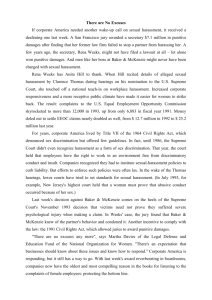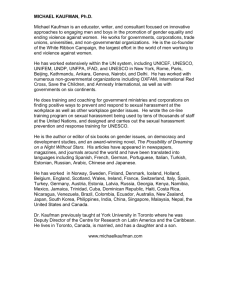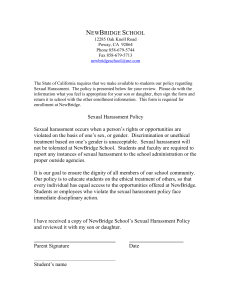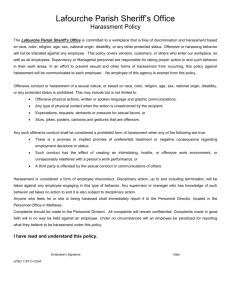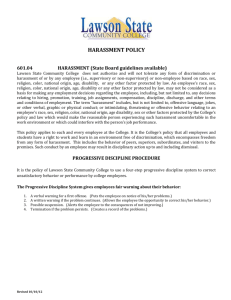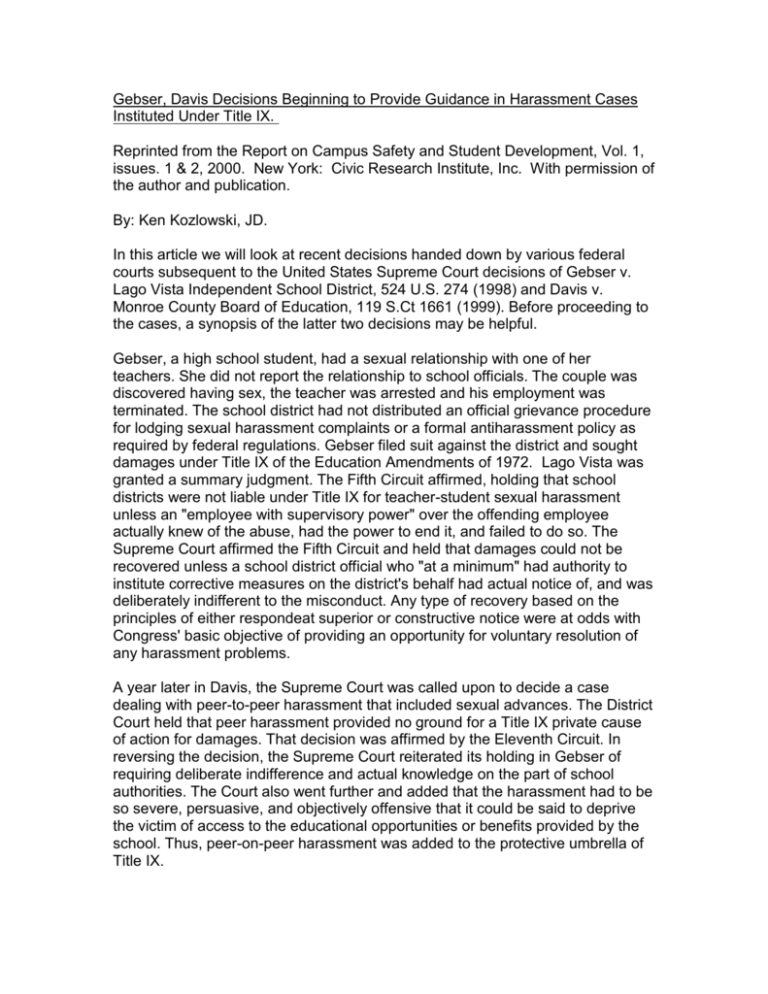
Gebser, Davis Decisions Beginning to Provide Guidance in Harassment Cases
Instituted Under Title IX.
Reprinted from the Report on Campus Safety and Student Development, Vol. 1,
issues. 1 & 2, 2000. New York: Civic Research Institute, Inc. With permission of
the author and publication.
By: Ken Kozlowski, JD.
In this article we will look at recent decisions handed down by various federal
courts subsequent to the United States Supreme Court decisions of Gebser v.
Lago Vista Independent School District, 524 U.S. 274 (1998) and Davis v.
Monroe County Board of Education, 119 S.Ct 1661 (1999). Before proceeding to
the cases, a synopsis of the latter two decisions may be helpful.
Gebser, a high school student, had a sexual relationship with one of her
teachers. She did not report the relationship to school officials. The couple was
discovered having sex, the teacher was arrested and his employment was
terminated. The school district had not distributed an official grievance procedure
for lodging sexual harassment complaints or a formal antiharassment policy as
required by federal regulations. Gebser filed suit against the district and sought
damages under Title IX of the Education Amendments of 1972. Lago Vista was
granted a summary judgment. The Fifth Circuit affirmed, holding that school
districts were not liable under Title IX for teacher-student sexual harassment
unless an "employee with supervisory power" over the offending employee
actually knew of the abuse, had the power to end it, and failed to do so. The
Supreme Court affirmed the Fifth Circuit and held that damages could not be
recovered unless a school district official who "at a minimum" had authority to
institute corrective measures on the district's behalf had actual notice of, and was
deliberately indifferent to the misconduct. Any type of recovery based on the
principles of either respondeat superior or constructive notice were at odds with
Congress' basic objective of providing an opportunity for voluntary resolution of
any harassment problems.
A year later in Davis, the Supreme Court was called upon to decide a case
dealing with peer-to-peer harassment that included sexual advances. The District
Court held that peer harassment provided no ground for a Title IX private cause
of action for damages. That decision was affirmed by the Eleventh Circuit. In
reversing the decision, the Supreme Court reiterated its holding in Gebser of
requiring deliberate indifference and actual knowledge on the part of school
authorities. The Court also went further and added that the harassment had to be
so severe, persuasive, and objectively offensive that it could be said to deprive
the victim of access to the educational opportunities or benefits provided by the
school. Thus, peer-on-peer harassment was added to the protective umbrella of
Title IX.
The following cases have been decided using the principles originated within the
Gebser and Davis decisions:
Reese v. Jefferson School District No. 14J, 208 F.3d 736 (9th Cir. 2000)
In this case, the school district excluded four female students from their
commencement ceremony for throwing water balloons at boys in a boys'
restroom. The female students claimed they were retaliating for alleged
harassment committed by male students. The females had never reported any
harassment prior to the water balloon incident, and the males did not admit to
any misconduct. The Title IX action alleged that the district was liable for the
harassment allegedly committed by the boys during the school year. The court,
relying on Gebser and Davis, found the school district not liable because the
plaintiffs had failed to show the district was deliberately indifferent to sexual
harassment of which it had actual knowledge.
Murrell v. School Dist. No. 1, Denver, Co., 186 F.3d 1238 (10th Cir. 1999)
A Mother, as guardian ad litem for her daughter, brought suit against a school
district for alleged knowledge of and failure to remedy sustained sexual
harassment, including assault and battery of a developmentally and physically
disabled student. The district court had held that Title IX provided no cause of
action against a school district for student-on-student sexual harassment. The
appeals court, after oral argument, abated the case pending the Davis decision.
After Davis was handed down, the appeals court analyzed the case in light of
that decision. The court held that there was actual knowledge and deliberate
indifference on the part of requisite personnel within the school district. The
school principal herself was aware of the harassment and the court imputed her
knowledge to the school district. The case was reversed and remanded to the
district court.
Wills v. Brown University, 184 F.3d 20 (1st Cir. 1999)
Wills, a graduate of Brown University, filed suit against the university and a
professor alleging "hostile environment sexual harassment" and "quid pro quo
sex harassment." The professor had allegedly pulled Wills on to his lap, rubbed
her stomach, and twice touched or rubbed her breasts. She filed a complaint with
Brown and the professor was reprimanded and put on probation. In March of
1994, after repeated complaints against the professor were filed, his employment
was terminated. Wills' harassment claims were disposed of by a directed verdict
in federal district court. Wills appealed the district court's ruling. Wills specifically
appealed the district court's decision that disallowed into evidence any mention of
sexual harassment of other students after the professor's reprimand and
probation in December of 1992. The court ultimately held that although Brown's
handling of the harassment claims was arguably inept, Wills could not prove that,
in her case, the probation and reprimand did not stop the professor's harassment
of her personally. Because Brown had taken a timely and reasonable measure to
end the harassment, Wills Title IX claim failed and evidence of further
harassment committed against other students was not relevant to her case.
Kinman v. Omaha Public School Dist., 171 F.3d 607 (8th Cir. 1999)
Kinman brought a Title IX hostile environment sexual harassment suit against the
school district, several school officials, and a high school teacher with whom
Kinman had a homosexual relationship. After bouncing between the district and
appeals courts, the Eighth Circuit was again called upon to render a decision in
light of Gebser. In its previous decision, the appeals court had used the standard
for school district liability under Title IX of whether the district knew or should
have known of the harassing behavior. In light of Gebser, the court found there
was actual knowledge but that the district and its personnel had investigated the
allegations and initiated termination proceedings once they obtained conclusive
proof of the relationship between Kinman and the teacher. Thus there was no
deliberate indifference and Kinman's Title IX claim failed.
Morse v. Regents of University of Colorado, 154 F.3d 1124 (10th Cir. 1998)
Angela Morse and Stacey Handley claimed that while enrolled as students in the
University of Colorado's ROTC program, they were subjected to acts of gender
bias and harassment that created a sexually hostile educational environment.
They filed suit under Title IX against the University. The University denied
liability, stating that they were not liable for acts of members of the ROTC
because the members were not agents of the University subject to University
control. The district court, in dismissing the claim, had analyzed it before Gebser
was decided and adopted the view that institutional liability under Title IX was
governed by agency principles. The appeals court, which issued its decision
post-Gebser, stated that Gebser clearly rejected the theories of vicarious liability
and agency liability. In this case, the court decided that an ROTC instructor and a
senior cadet, the ones accused of the harassment, were under University control
because the ROTC program was offered by the University. The appeals court
reversed the dismissal of the Title IX claim, holding that it could be reasonably
inferred that the University was responsible for the acts of the two ROTC
members. The students had also reported the incidents to a University dean and
the University Affirmative Action Officer, both of whom presumably had the
authority to address the alleged discrimination and to institute corrective
measures.
Crandell v. New York College, Osteopathic Medicine, 87 F. Supp.2d 304
(S.D.N.Y. 2000)
Colleen Crandell sued the New York College of Osteopathic Medicine and the
New York Institute of Technology, alleging that she was subject to sexual
harassment throughout much of her training and during her internship at St.
Barnabas Hospital. The court viewed the harassment as ranging from "tasteless
and insensitive to egregious." In all, the court reviewed eight specific instances of
harassment. Only one of the incidents, however, was reported by Crandell. She
reported that incident to an attending physician in charge of all medical students
at the hospital where the harassment occurred, and to NYCOM's Associate Dean
of Clinical Affairs. Fearing for her career, she did not disclose any of the other
harassment incidents. That course of action, according to the court, proved fatal
to all claims under Title IX with the exception of the one she had reported. Under
Gebser, actual notice is a requirement under a Title IX claim and even though
Crandell's reticence may have been understandable, the court had no choice but
to dismiss the bulk of her claims.
Warren ex rel. Orlando v. Reading School District, 82 F. Supp.2d 395 (E.D.Pa.
2000)
A student's mother discovered that he was engaging in inappropriate physical
contact with a teacher and reported it to Berks County Children and Youth
Services. The teacher was suspended with pay and ultimately resigned his
position. The student brought a Title IX claim against the school district and won
a $400,000 jury verdict. The district appealed, claiming no actual knowledge of
the events as required under Gebser. The court found that the jury was
presented with ample evidence to find that the school's principal had actual
notice of, and was deliberately indifferent to the teacher's misconduct. Another
boy's father had reported some inappropriate contact between his son and the
teacher to the principal and to the school's guidance counselor. There were also
two supervisory conference memoranda that detailed discussions with the
teacher concerning "physical contact" and "horseplay" within the classroom
during recess. This was enough, the court decided, to impute actual knowledge
to the school district through the principal. The principal had enough authority to
take action to remedy the situation, but did not.
Turner v. McQuarter, 79 F Supp.2d 911 (N.D.Ill. 1999)
Meredith Turner sued her former basketball coach and Chicago State University
alleging she was coerced into pursuing a sexual relationship with the coach.
Chicago State argued that it had no actual notice of the relationship. Turner put
forth that Chicago State knew of the inappropriate relationship because official
college records indicated that both Turner's and the coach's home addresses
were identical. No other notice to school officials was given. The court looked at
two possibilities for actual notice: the athletic director or board of trustees via the
school records, or the coach herself as an official in charge of the scholarship
program. The court disposed of the former by stating that identical addresses did
not provide actual notice of misconduct, and that it was hard to imagine under
what circumstances the addresses would have come to the attention of school
officials. The court also found no actual notice imputed to Chicago State via the
coach. If the coach was not the harasser, she certainly could have served to
satisfy the notice requirement if her assistants, trainers, or players were
committing harassment. As in Gebser, the argument that a harasser having
actual knowledge of the conduct would fulfill the requirement did not fly. Turner's
complaint was dismissed in accordance with the Supreme Court's decision in
Gebser.
Sherman ex rel. Sherman v. Helms, 80 F. Supp.2d 1365 (M.D.Ga. 2000)
Middle school student LaKisha Sherman and her mother sued the board of
education, among others, following her alleged rape by a custodian in October
1996. The incident was not reported or discovered before the middle school
uncovered it during its own investigation. Also in October 1996, several other
students reported that the custodian was making sexual advances toward them.
A subsequent investigation uncovered the Sherman incident. The school board
claimed no actual knowledge of any incident. Sherman disputed that by pointing
out that the first report of sexual harassment by the custodian came about one
week prior to the alleged rape. The court stated that the school had taken
appropriate measures with the custodian after the first reports came in by
warning him of termination if the harassment continued. The custodian denied
any harassment on his part, and was not fired at that time. The court held that
complaints of harassment from students other than LaKisha Sherman did not
amount to actual knowledge by school district officials that the custodian would
sexually assault another student not involved or mentioned in the complaint. After
becoming aware of the Sherman situation, the principal of the school took
immediate action and the school superintendent terminated the custodian's
employment. Sherman's Title IX action was dismissed.
Doe v. Dallas Independent School District, 220 F.3d 380 (5th Cir. 2000)
A summary judgment handed down in favor of the defendant school district in a
lower court was affirmed by the Fifth Circuit. Plaintiffs had alleged "deliberate
indifference" on the part of a school principal who had been informed of a
fondling incident between a teacher (John McGrew) and a pupil. The principal
investigated by interviewing the student, speaking with his mother, teacher, and
the one accused of fondling. She also warned McGrew that if the allegation
proved true, he would be "dealt with." The principal then concluded, incorrectly
as it turned out, that the allegation was untrue. The court held that the principal's
response was adequate and did not constitute deliberate indifference. This was
so even though McGrew was later convicted in state court on one count of
aggravated sexual assault and two counts of indecency with a child. He was
sentenced to one life sentence and two twenty-year sentences.
Gant v. Wallingford Board of Education, 195 F.3d 134 (2nd Cir. 1999)
This case involved an allegation of intentional race discrimination against a six-
year-old child. The student was initially placed in a first-grade class after
transferring to his new school. Two weeks later, he was transferred to a
kindergarten class. The student was African-American, and the school was 1-2%
African-American. The student was also subjected to racial name calling by other
students. The student's father complained, and the school superintendent
investigated the racial insults as well as the kindergarten transfer. The
superintendent found that there was no "persuasive evidence" that the student
had been subjected to constant abuse of a racial nature, and that the transfer
was appropriate. A lawsuit was commenced, naming the school district and
various school officials and teachers as defendants. The district court granted
summary judgment in favor of the defendants, holding that the response to the
racial incidents did not amount to deliberate indifference. The transfer was also
found to be justified based on the records, reports, and assessments performed
by school officials prior to the transfer. The appeals court affirmed the judgment,
borrowing the Davis court's reasoning on deliberate indifference.
Litman v. George Mason University, 186 F.3d 544 (4th Cir. 1999)
Annette Litman alleged that a professor (Eugene Norris) became infatuated with
her, routinely telling her that he loved her and asking about her sex life. She also
accused Norris of stalking her on campus, as well as via e-mail. Litman
eventually filed a sexual harassment complaint against Norris with George
Mason University's (GMU) Equity Office. The Equity Office ordered ordered
Norris to avoid contact with Litman, but refused to investigate the complaint
further, characterizing Litman's allegations as a "fishing expedition." Litman then
sought intervention by GMU's president. GMU failed to undertake any
investigation.
Unable to locate a professor to supervise her senior research project, Litman
alleged that GMU's faculty refused to interact with her once the sexual
harassment complaint became known. Litman then sent "suggestive and hostile
e-mail" messages to certain faculty members that resulted in sexual harassment
charges being lodged against her. She was tried before GMU's Judicial Board,
found guilty, and expelled. Her complaint against Norris was also tried, with the
result being a finding that Norris had not violated GMU's sexual harassment
policy. Litman then filed a Title IX action against GMU for discrimination and
retaliation. GMU moved to dismiss by invoking Eleventh Amendment immunity.
The district court denied GMU's motion, saying it had waived the immunity by
accepting Title IX funding. The funding was conditioned on an "unambiguous
waiver of immunity" codified in 42 U.S.C. §2000d-7(a)(1). GMU appealed. The
appeals court affirmed, looking to Gebser and Davis for guidance as to the
spending power of the federal government. The court found that the government
"conditions an offer of federal funding on the promise of the recipient not to
discriminate" and "also conditions the funds on the recipient's consent to be sued
in federal court for an alleged breach of the promise not to discriminate." It
appears, at least in the 4th Circuit, 11th Amendment immunity is not available to
those receiving Title IX funds.
Adusumilli v. Illinois Institute of Technology, 1999 U.S. App. LEXIS 17954 (7th
Cir. 1999)
Adusumilli alleged that on twelve separate occasions, four male professors and
six male students (who were also police officers) had subjected her to sexual
harassment. She also alleged that after complaining about the harassment, she
was given "unfair grades." The district court ruled that she had failed to state a
Title IX claim, and dismissed her complaint. She appealed.
The four alleged acts of harassment by the professors involved "ogling" and
"unwanted touching" of her arm and back. Five of the eight student acts involved
similar touching of the hand, shoulder, back and leg. One of the other three
incidents involved a kiss on the cheek at graduation. The last two incidents
involved touching of the top and bottom of Adusumilli's breast. She complained
about only two of the incidents to school officials: the touching of her right
shoulder by a student named "Sam," and the touching of her breast by another
student. The court stated that Illinois Institute of Technology (ITT) could have
known of the incidents only if Adusumilli had complained about them to school
officials, as required under Gebser and Davis. Adusumilli never alleged that any
of the professors were themselves school officials. The court then looked at the
two incidents that were actually reported. The court saw those as single incidents
of student misconduct. Each incident ceased as soon as it occurred, and was not
repeated. The court stated that they were convinced that neither incident
involved "pervasive" and "offensive" harassment of the type that would be
actionable under Title IX.
The court also disposed of the retaliation claim by reviewing her complaint and
deciding that Adusumilli herself recounted a "variety of grounds" for the poor
grades. She had, in essence, pleaded "herself out of court." The district court's
determination was affirmed.
Elgamil v. Syracuse University, 2000 U.S. Dist. LEXIS 12598 (N.D.N.Y. 2000)
Lisa Elgamil's odyssey started soon after entering Syracuse University's Child
and Family Studies Department as a doctoral candidate. She completed the
requisite course work, but continually failed to pass all of the written
comprehensive exams required of all candidates to continue their pursuit of the
doctoral degree. Dr. Jaipaul Roopnarine was her advisor, as well as serving as
the exam coordinator for the entire department. On her first attempt at the
exams, she passed two and failed two. The exams are independently graded by
two evaluators. Roopnarine authored and graded two of her exams. She retook
the two failed exams and failed one, despite being given the same questions.
This time, Roopnarine was not one of the evaluators. Elgamil complained to the
chair of the department, Norma Burgess, that she could no longer work with
Roopnarine because he yelled at her, was rude to her, and was not responsive
or helpful. She gave no indication of sexual harassment. Elgamil was assigned a
new advisor, Melissa Clawson. Roopnarine had no further contact with Elgamil.
Elgamil complained further about Roopnarine for the purpose of ensuring that he
would not be involved in her third attempt to pass the exams. For the first time
she mentioned sexual harassment, but did not elaborate beyond her previous
claims of rudeness and non-responsiveness. Clawson wrote the exam, and
Burgess was responsible for overseeing the grading. Elgamil again failed the
exam. Burgess notified Elgamil of the failure, and offered to let her take it a fourth
time (against usual department procedure) or be recommended for a masters
degree based on her graduate work. Elgamil rejected both offers. Six months
later, she filed a sexual harassment complaint against Roopnarine with the
University. Aside from her previous complaints, for the first time Elgamil alleged
that Roopnarine had 1) talked to her about his sex life, and 2) told her about a
dream he had in which he, Elgamil, and Elgamil's husband were present. The
University concluded that even if the alleged conduct was true, it did not
constitute sexual harassment. Elgamil then filed a Title IX suit that alleged a
hostile educational environment. The University moved for a summary judgment.
The court analyzed Elgamil's hostile environment claim and decided that the
incidents were neither severe nor pervasive. Even if they were, however,
Elgamil's claim would still have failed. The court stated that by the time of the
third exam, Roopnarine had no involvement with her educational experience. The
court called that fact fatal to her claim.
Other Cases to Consider
Vaird v. School District of Philadelphia, 2000 U.S. Dist. LEXIS 6492 (E.D.Pa.
2000)
Female-on-female assault and sexual assault. Court held that school district was
not deliberately indifferent to sexual harassment.
Morlock v. West Central Education District, 46 F.Supp.2d 892 (D.Minn. 1999)
Allegations of teacher-student and student-student sexual harassment. Summary
judgment motion denied as court found that officials had notice and actual
knowledge of harassment. Court also found that a reasonable jury could find that
officials with authority to remedy the situation responded with deliberate
indifference.
Massey v. Akron City Board of Education, 82 F.Supp.2d 735 (N.D.Ohio 2000)
Another summary judgment motion denied because the record contained
sufficient evidence to raise an issue as to whether the Board had actual
knowledge of an employee's wrongful conduct and was deliberately indifferent.
Waters v. Metropolitan State University, 91 F.Supp.2d 1287 (D.Minn. 2000)
Summary judgment granted to University because plaintiff offered no evidence
that her sexual relationship with professor was "unwelcome."
Manfredi v. Mount Vernon Board of Education, 94 F.Supp.2d 447 (S.D.N.Y.
2000)
Plaintiff's second-grade daughter was subjected to hitting, spitting, and pushing
from a male classmate. Summary judgment granted to Board because the court
found what took place between the youngsters did not amount to sexual
harassment.


